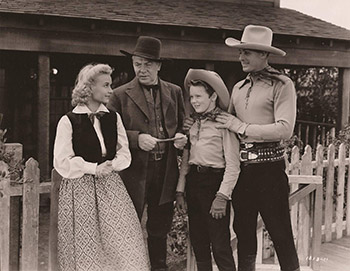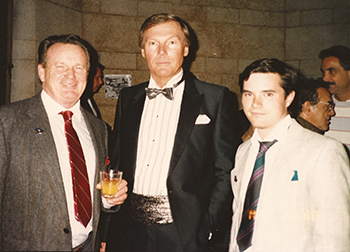Author: Keith Aiken Special Thanks to William Winckler
A SCIFI JAPAN EXCLUSIVE
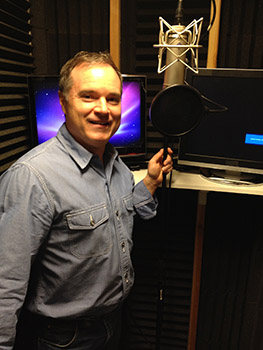 English dubbing director William Winckler in the recording booth. Photo courtesy of William Winckler.
English dubbing director William Winckler in the recording booth. Photo courtesy of William Winckler.Tsuburaya Productions` original ULTRAMAN (???????????????, Urutoraman: Kuso Tokusatsu Shirizu, 1966-67) television series was a syndication hit in America, airing on stations around the country for close to two decades. Despite that, the Japanese company had -- at best -- limited success getting other titles in the Ultra franchise distributed in the US... years of effort resulted in a few co-productions, a handful of home video releases, some festival screenings, and the occasional TV broadcast, but nothing of any consistency. The tide finally began to turn in 2014, as Tsuburaya entered into an agreement with Crunchyroll to stream several of the older shows and -- for the first time -- simulcast the latest series, ULTRAMAN X (???????, Urutoraman Ekkusu, 2015) and ULTRAMAN ORB (?????????, Urutoraman Oobu, 2016). This past January saw another first for the franchise; the two most recent Ultraman movies received a limited theatrical run in North America as an English dubbed double feature. The screenings were put together by Tsuburaya Productions and William Winckler, the veteran dubbing director who supervised the English language versions of ULTRAMAN GINGA S THE MOVIE (??? ?????????? ??! ????10??!!, Gekijoo-ban Urutoraman Ginga S Kessen! Urutora 10 Yuushi!!, 2015) and ULTRAMAN X THE MOVIE (??? ??????? ??????????????, Gekijoo-ban Urutoraman X Kita Zo! Ware-ra no Urutoraman, 2016). Winckler and his team also dubbed the TV compilation film ULTRA FIGHT VICTORY (?????????????, Urutora Faito Bikutorii, 2015), which was not included in the recent theatrical release. William Winckler recently spoke with SciFi Japan about his career and dubbing the Ultraman films, and his excitement and enthusiasm for the work was evident... SciFi Japan: Please tell us a bit about your background.
William Winckler: I come from a show business background. My late father, Robert "Bobby" Winckler, was a famous child star during Hollywood’s “Golden Age,” having worked in over eighty-five films and over two-hundred radio shows during that time. As an adult he was a successful entertainment attorney representing movie stars, producers, studios, etc. I got into the entertainment industry in 1984, and since then have written, produced, directed and acted in over fifty-something films and TV shows, including a tremendous amount of English dubbed anime. Just as an actor, I think it’s over eighty films. My company, William Winckler Productions, produces high quality Hollywood English dubbed productions for Japanese studios, for both anime and live-action. Over the years I’ve worked for many of the different studios, companies, game companies, toy companies in Japan, and I’ve even been acknowledged by Jetro [Japan External Trade Organization] Los Angeles, which is essentially the Japanese government. I’ve attended several Japanese government events, including a reception at the Japanese consulate general’s mansion, and I was sent to Japan on behalf of Jetro to assist new Japanese companies a couple years ago. SciFi Japan: When did you begin dubbing films and anime? What titles have you worked on? William Winckler: I was the youngest producer of syndicated television in 1984, having produced the English version of Tatsunoko Production Company’s classic sci-fi superhero series TEKKAMAN THE SPACE KNIGHT. I started after Sandy Frank did BATTLE OF THE PLANETS, but was in the business before Carl Macek did ROBOTECH and before many other U.S. anime licensees got into business... and I’m still standing and working today, while many are long gone or sadly deceased.
It’s interesting to point out that I had my father do the American voice of Dr. Edward Richardson, the father figure / commander in the TEKKAMAN series. I was able to get him to return to acting that one last time, and he did a fantastic job. He passed on in 1989. So, my father, who was actually in the famous OUR GANG / LITTLE RASCALS shorts of the 1930’s did an anime series in 1984! There’s trivia for you! When this country had a real syndicated television market back in the day, I used to attend NATPE; we had a William Winckler Productions booth, and I’d sell TEKKAMAN to independent TV stations all across America and in Canada. Some of the other classic anime titles I’ve worked on through the years include GAIKING, DANGUARD ACE, STARZINGER, FIST OF THE NORTH STAR, SPACE PIRATE CAPTAIN HARLOCK, KITARO, LUNLUN THE FLOWER GIRL, ADVENTURES OF NADJA, DIGIMON FUSION BATTLES, PRETTY CURE 5, FREE!, and others! We made a wonderful full length anime feature film called EDEN for Production Reed, which was very much like a classic Tezuka funny animal anime. I also made presentation pilots, including one for Tezuka’s anime classic MICROID S, retitled THE MICRO-AGENTS. Some of the live-action movies include ZOMBREX: DEAD RISING SUN, which is based on the famous Capcom zombie video game DEAD RISING, and the retro monster movie FRANKENSTEIN VS. THE CREATURE FROM BLOOD COVE. We also made a live-action film in Hollywood loosely based on the anime STARZINGER that was intended for the Sci-Fi Channel. The famous, classic MINKY MOMO anime series was distributed by my company, and we also do a ton of English soundtracks for Japanese companies that produce video games, phone apps, motion comics, etc., sometimes in multiple languages such as English, French, German, Spanish, Korean, etc. Although we did not dub the series, we recently handled all the close-captioning (for the hearing impaired) for the cult sci-fi anime series NO GAME, NO LIFE. One of the craziest projects we did was produce all the Indonesian language soundtracks for the Bandai Namco video game GREAT ANIMAL KAISER! Yes, being based in Hollywood, talented actors from all over the world come here, and we auditioned several Indonesian voice actors for this job. When dubbing foreign languages like this, we also hire assistant directors who speak the native tongues for quality control.
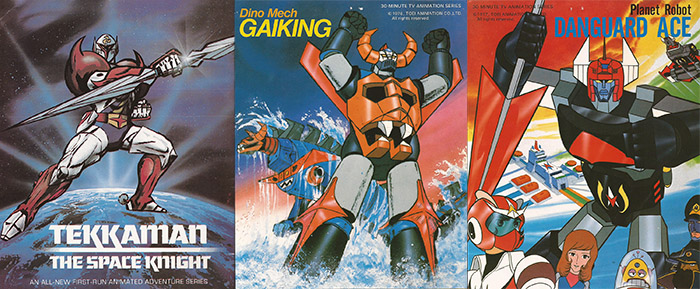 Winckler got his start on English language versions of anime. Photos courtesy of William Winckler. TEKKAMAN THE SPACE KNIGHT © Tatsunoko Production. GAIKING and DANGUARD ACE © Toei Animation
Winckler got his start on English language versions of anime. Photos courtesy of William Winckler. TEKKAMAN THE SPACE KNIGHT © Tatsunoko Production. GAIKING and DANGUARD ACE © Toei AnimationSciFi Japan: The technology and business of dubbing films and shows has evolved dramatically over the past 30+ years... William Winckler: In the early days I worked in the analog world, and the production process of English dubbing anime was totally different. In fact, I used to work on a moviola with 16mm films of TEKKAMAN. We used to dub at Bob Clampett’s old Hollywood studio where he recorded his BEANIE AND CECIL cartoons. Nowadays, it’s so much easier working with files in the digital age. I’ve witnessed the entire industry change over the years. I’m still very close friends with Fred Ladd and Corinne Orr. Fred of course, is the man responsible for bringing Japanese anime to American television for the very first time in the 1960’s with ASTRO BOY, KIMBA THE WHITE LION and GIGANTOR. In fact, I handle GIGANTOR merchandise licensing for Fred. Corinne Orr is like an aunt to me; we talk all the time. She did voices for many classic Japanese anime shows, was the voice of Trixie, Spritle, and all the females in SPEED RACER, as well as the voice of Marine Boy. Corinne even did voices in the classic English dubbed ULTRAMAN series, and many of the English dubbed Godzilla and Gamera movies. She did the voices of Mothra’s twin fairies in [the American dub of] GODZILLA VS. THE SEA MONSTER! Most of the Japanese anime and Japanese monster movies that were English dubbed back in the 1950’s, throughout the 1960’s, and into the 1970’s happened in New York, with the famous company TITRA (the original company no longer exists). That is where Fred Ladd and Corinne Orr, the late Peter Fernandez, and all the rest originally worked and dubbed. Their work was great, and I still love those dubs, although today we do it a little differently and without the slight “Asian accents.” At the time the accents seemed necessary, but not today. SciFi Japan: How did you get the assignment to dub the Ultraman movies? William Winckler: Winckler Productions and Tsuburaya Productions have been communicating back and forth for many years.
Believe it or not, Winckler Prods. proposed making an English version of the series ULTRAMAN 80 around 1987, that was to have famous BATMAN TV actor Adam West playing the role of a space captain patrolling Earth, monitoring for alien invasions (ala Raymond Burr in the classic GODZILLA or 7-Zark-7 in BATTLE OF THE PLANETS). In ULTRAMAN 80 there was a space carrier, and this vehicles orbiting footage would be used, along with an identical interior set that Adam West was to appear in, shot in Hollywood. Adam was willing to do it, we were several years before Saban’s Americanized POWER RANGERS, but the project never happened. Years later I saw Adam backstage at a taping of the TONIGHT SHOW at NBC, and he said to me, “Billy, POWER RANGERS stole your idea!” We laughed! That’s showbiz! As far as the new English language versions of the new Ultraman films, it’s a long story, but in a nutshell the time had finally come: Tsuburaya realized they needed to own their own Hollywood English language versions of their most successful movies for worldwide distribution, especially since English has pretty much become the “language of the world.” They needed to expand their audiences, and really have more mainstream English language movies for American children and families. In fact, [SciFi Japan editor] Bob Johnson referred me much earlier to the head of international, after the old guard left Tsuburaya. When I was in Tokyo a couple years ago, the head of international and I had a dinner meeting, and we went into serious discussions of what could be done and how Winckler Productions could help Tsuburaya.
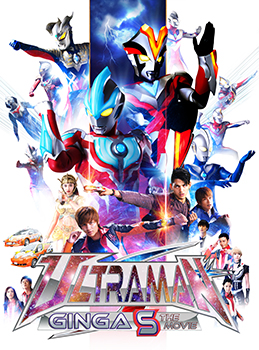 Winckler`s first collaboration with Tsuburaya Productions was the English dub of ULTRAMAN GINGA S THE MOVIE. Image courtesy of Tsuburaya Productions and William Winckler Productions. © 2015 UGS FILM PARTNERS.
Winckler`s first collaboration with Tsuburaya Productions was the English dub of ULTRAMAN GINGA S THE MOVIE. Image courtesy of Tsuburaya Productions and William Winckler Productions. © 2015 UGS FILM PARTNERS.SciFi Japan: Was this your first time working with Tsuburaya? William Winckler: Yes, ULTRAMAN GINGA S THE MOVIE was the first production we worked on together. I must say that I am honored and grateful to work with such a fantastic company on their iconic brand. When I was a kid in elementary school, I used to come home from school, have milk and cookies, do my homework, and then watch the English dubbed ULTRAMAN on TV, Monday through Friday! It was like watching a mini Godzilla movie every day! All my friends at school loved Ultraman. So, it’s a special treat for me, many years later, to be the Hollywood writer, producer, director of the American English language versions of the new Ultraman movies! Life can be magical sometimes. I think Eiji Tsuburaya was a genius, and I feel morally obligated to produce the finest English language versions of the Ultraman films and TV shows as I possibly can. Arguably, in the country of Japan, the three biggest, most famous sci-fi live-action brands or franchises are Godzilla, Ultraman, and Power Rangers / Super Sentai. That’s it. So, I’m thrilled to be working on one of the top three iconic titles. SciFi Japan: Why does Tsuburaya Productions feel it’s important to have English language versions of the Ultraman movies available now? William Winckler: As I said, the whole world essentially speaks English, and children do not read subtitles. Period. Kids will not watch subtitled content. Ultraman’s core audience has always been children and families. Kids are very important to Tsuburaya Productions! Fine Hollywood English language versions of these films open them up to infinitely bigger mainstream audiences across America and worldwide. From a financial point of view, it is vitally important. Most major television platforms and most of our U.S. movie theaters wanted English dubbed movies, not subtitled films. It’s no secret that Bandai toy company is a 49% stockholder in Tsuburaya Productions, and therefore, it is especially important for toy sales that all the Ultraman films have quality Hollywood English dubs so English speaking children worldwide fall in love with the property and develop interest in the merchandising. Children are the core customer base for the toy sales. Yes, there are also lines of toys for collectors and adults, but the main customer base remains children. When you look at how successful Haim Saban has been with the POWER RANGERS brand, and how he transformed it into such a tremendous success all across America and other parts of the world, again, you see the English language content was vitally important and responsible for that success with audiences of children, especially little boys ages six to ten. There are now permanent POWER RANGERS aisles in every Toys R Us store, and all the other major stores toy departments in America, and that’s all thanks to Saban’s English language POWER RANGERS productions, not subtitled Super Sentai. SciFi Japan: What about the older and/or hardcore fans in America who would prefer to see these films in the original Japanese?
William Winckler: Winckler Productions has also made English subtitled versions of every film we’ve dubbed for Tsuburaya. These subtitled versions are based on Winckler Productions` English translator Emily Midori Nelson’s Japanese-to-English translations. Ms. Nelson is a brilliant Japanese-American translator, who’s originally from Japan, and it’s her authentic, faithful, scripts which are solely used for our English subtitled movies. Her scripts are also the basis of my English dubbing scripts. I’m fully aware there are purist fans who love Ultraman but who are not six to ten years old anymore, and they want to watch the Japanese versions. For those audiences, when the films are sold on Blu-ray and DVD, or on certain other types of streaming platforms, they can select to see the subtitled versions. We have those purist audiences covered and they will be satisfied. But honestly, for the overwhelming majority of our audiences, mainstream American kids and families, it is our English dubbed films that most everyone will be watching. There’s nothing worse than watching a bad dub, and at the same time, there’s nothing better than watching a fantastic dub with terrific acting and near perfect lip sync. Think about a typical film production for a moment... what happens on an Ultraman movie set. The Japanese director and film crew set up shot after shot to get the perfect, most beautiful images for the silver screen. The Director of Photography and lighting guys spend hours tinkering around to get the light just right. The hair and make-up people try to make the actors look perfect. The special effects team take so much time to set up the perfect FX shots... and so on. If the film is later subtitled for foreign audiences, the foreign audience is only seeing half the picture, because they are “reading it” instead of watching it. Pure cinema is supposed to be a “cinematic experience”... a “visual experience”. And if you’re looking at the bottom half of a movie theater screen, you’re spoiling everything the Director, DP, lighting guys, FX team, etc., were trying to create. The human brain cannot do two things fully at once. The perfect, widescreen cinematic shots are partially ruined. You also lose your audience of children, to add insult to injury. [With quality English language versions] adults can totally enjoy the films as well, and the dubbed movies could easily play on prime time TV, not just kids television time slots.
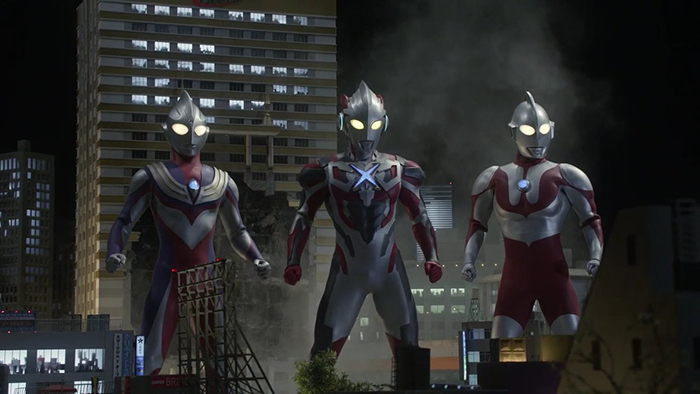 Having English dubbed and subtitled versions of the films will give Tsuburaya Productions more opportunities to market Ultraman worldwide. ©2016 UX FILM PARTNERS
Having English dubbed and subtitled versions of the films will give Tsuburaya Productions more opportunities to market Ultraman worldwide. ©2016 UX FILM PARTNERSSciFi Japan: What types of film elements does Tsuburaya provide for you to work from? William Winckler: We receive the best HDD source materials available for both our subtitled and English dubbed versions. I usually receive the Japanese language scripts, which immediately go to Emily Midori Nelson for translations. SciFi Japan: How long does it take to complete an English dubbed film? William Winckler: Once we have all the materials we need, usually four to six weeks. Closer to six weeks if there’s a lot of tricky dialog. SciFi Japan: How were the voice actors selected for the Ultraman films?
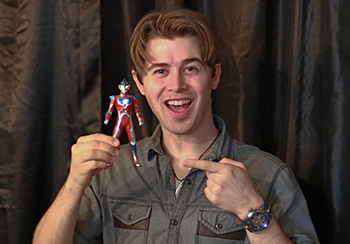 Actor Nick Clark has already provided the voice of Hikaru Raido/Ultraman Ginga in three different movies. Photo courtesy of William Winckler.
Actor Nick Clark has already provided the voice of Hikaru Raido/Ultraman Ginga in three different movies. Photo courtesy of William Winckler.William Winckler: William Winckler Productions is a Southern California-based film and television production and distribution company, and all the actors we hire are working, professional Hollywood actors. These actors all have Hollywood agents and managers, and are working all the time or auditioning. They have great experience, they know how to take direction, and have the ability to loop and dub. Most importantly when it comes to dubbing, it’s like trying to fit a key in a lock. I need the right American voice to match the Japanese actor’s voice. It must have the same tone, range, sound, pitch, texture, quality, etc., of the Japanese actor. I will play actor voices over demo reels, and compare them to the Japanese footage of the characters they are playing, and when there is a perfect match, you’ve got your American voice! One bizarre story: I came across a perfect voice match for Prof. Tamaki (Takami Yoshimoto`s character in ULTRAMAN X THE MOVIE) in voice actress Pamela Hill. After I had cast Pamela, I did a double-take on her resume and noticed she previously did the voice of a child in the English dubbed Ultraman Gaia movie [1998`s ULTRAMAN GAIA: THE BATTLE IN HYPERSPACE]! I could not believe this, because the odds against this were astronomical! I had no idea she had worked on an Ultraman film a dozen years earlier. Another funny story: I’m friends with several movie stars and TV celebrities, and I asked one particular star if he’d like to do some voices in our Ultraman movies. As soon as he saw some footage, he said to me, “Bill, this is a ‘Godzilla thing’!”, adding, “I can’t do this! I’m a serious, dramatic actor! I was nominated for an Emmy!” I then replied, “But ____, this is super famous, Japan’s most famous superhero, wouldn’t you like to do it just for shits and giggles? Your kids would get a big kick out of it.” He didn’t, but I had to laugh, because the story is so funny!
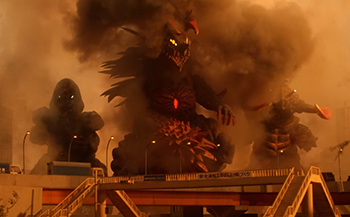 The monster Zaigorg (center) caused problems for Ultraman X... and the dubbing crew! ©2016 UX FILM PARTNERS
The monster Zaigorg (center) caused problems for Ultraman X... and the dubbing crew! ©2016 UX FILM PARTNERSSciFi Japan: Did you have a large pool of actors to choose from? William Winckler: We always get several thousand actor submissions from the agents and managers, and I considered literally hundreds of Hollywood voice actors for the roles in the films. As I said, all of our Hollywood voice actors are brilliant professionals with amazing past resume credits. That being said, once in a while, an actor will have a hell of a time with a line of dialog that’s a total tongue twister in English. One such line [from ULTRAMAN X THE MOVIE] was “Zaigorg’s spines have transformed into clones of Kaiju Demaaga!” That line was a killer for some reason! We finally got it on the fifth or sixth take. SciFi Japan: Some characters -- both Ultramen and humans -- appear in multiple movies. Are your actors voicing the same roles in different films? William Winckler: Yes, I’ve tried to have American voice actor continuity in all the Ultraman films. For example, the voice of Hikaru / Ultraman Ginga is played by young Hollywood actor Nicholas Clark. He’s in all three of our Ultraman films so far; ULTRAMAN GINGA S THE MOVIE, ULTRA FIGHT VICTORY and ULTRAMAN X THE MOVIE. Hollywood actor Bryan Forrest does the voice of Shou / Ultraman Victory in several films, and Daniel Van Thomas is the American voice of Ultraman Zero in two of the films. They are all wonderful performers, and this type of continuity helps “sell” the illusion I’m trying to create. I’m very proud of the Ultraman films we’ve produced so far, and think the Hollywood voice casts all did excellent work!
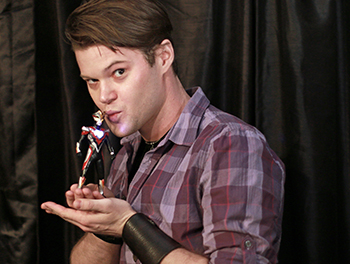 Bryan Forrest voices Shou/Ultraman Victory in the GINGA S movie and ULTRA FIGHT VICTORY. Photo courtesy of William Winckler.
Bryan Forrest voices Shou/Ultraman Victory in the GINGA S movie and ULTRA FIGHT VICTORY. Photo courtesy of William Winckler.SciFi Japan: Would you describe your process for translating and dubbing these movies? William Winckler: A magician never gives away his secrets to his magic tricks. Winckler Prods. uses a special method of English dubbing that I think is different from other companies. If you look at our films, our lip sync and performances are amazing. I’ve learned certain “tricks of the trade” over the past thirty plus years. My main objective is I’m trying to create an illusion, like a magician, so audiences, especially kids, think that the Japanese performers are Asian Americans living and working in Hollywood, and speaking their native American English tongue. After a while, you begin to fall under the spell, and don’t ever think about dubbing. Children don’t believe the films are dubbed. All of my Hollywood voice actors precisely replicate the thoughts and emotions of the Japanese actors on screen... the characters they are playing. The secret to acting is 80% emotion. My dubbing scripts are lip sync perfect, and the scripts have certain key instructions on how each line should be said, what pauses take place, any tempo changes, etc. So, when you have my scripts, which lay everything out, and I am there to direct the actors on each line, and the actors think and feel the exact emotions of the Japanese actors, you wind up with amazing performances. The illusion comes to life... and is no longer dubbing. If you know anything about film production, English dubbing of films is the most difficult thing in the world to do. It really is. I don’t think most fans realize how incredibly hard it is. It looks easy, but it ain’t! It’s like putting together a ten-thousand piece jigsaw puzzle!
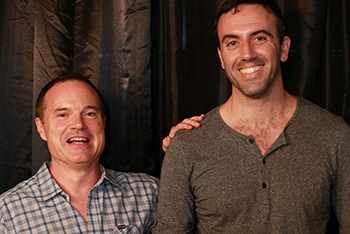 William Winckler with Daniel Van Thomas, the American voice of Ultraman Zero. Photo courtesy of William Winckler.
William Winckler with Daniel Van Thomas, the American voice of Ultraman Zero. Photo courtesy of William Winckler.In a way, it’s “almost” like recreating the entire movie from scratch. Not completely, but almost, because you’re having to recreate the entire soundtrack, all the characters, etc., and it is indeed like having to re-shoot the entire picture again. It’s like creating an all-new radio drama. I’ve often used editors and recording engineers who previously worked at Disney Studios on the Burbank lot. My main editor/engineer, Bradford Hill, previously worked in Disney Character Voices at Disney, and he’s a brilliant technician and artist. So, essentially, Winckler Prods. has Hollywood voice actors and ex-Disney Studios editors/engineers working on all of our productions. SciFi Japan: Is there much difference between the scripts for the subtitled and dubbed versions? William Winckler: The meaning always stays the same, but sentences [in the dubbing scripts] have to be reworked to make consonants, vowels, lip movements and shapes. How lips start a sentence and how they end a sentence are particularly important. Also, anything the character does vocally... laugh, cough, pant from running, yelling, screaming, drinking, eating, etc. must be recorded. Everything has to be written down in the scripts. Any little thing a Japanese actor does vocally you must write in the script for the Hollywood voice actor to replicate in the dubbing booth. Jokes can be rewritten a tiny bit, because often comedy does not translate. It gets very difficult when multiple characters are in a scene, all talking over each other. This is a sort of nightmare to write, because you have to write for each character, one character at a time, and loop the scene endlessly to make sure each character is perfectly covered and in sync. Like I stated earlier, it’s almost, but not quite, like remaking the entire movie again from scratch. A few years back, when we got super busy with multiple anime projects, I tried to bring in another Hollywood writer who was an iconic writer from major prime time TV; he had written for famous sci-fi television, etc. After trying it out, he said to me, “Bill, I don’t know how you do it... this is too hard for me! This is writing, but it’s also a totally different type of writing! I’m unable to do what you do!” So, I wound up working overtime to write the script I tried to assign to this famous writer who was interested in maybe giving it a crack. SciFi Japan: Are the stories Anglicized or edited for the American/international market? William Winckler: It’s important to note that Winckler Productions does not edit or alter the films in any way... each Ultraman film is essentially “uncut” and “unedited.” Our English dubbed versions remain 100% authentic/accurate; all the Japanese names remain, the dialog / story remains faithful, and nothing is edited out. This is great news for the fans, but sometimes, once in a great while, there is a scene with pregnant pauses.
Let me explain. Every now and then, a Japanese actor will take a pregnant pause. This type of pause is normal in Japanese, but to American audiences it can seem a bit unnatural. Now if a character says a sentence, and begins with a one-syllable word, then there’s a pause, then other one-syllable word, then another pause, then a two-syllable word, then another pause, followed by another one-syllable word... it is incredibly difficult to write that sentence. No matter what you do, the words you choose, how you rephrase the sentence, it will still seem a bit unnatural with the pregnant pauses. There is literally no way to correct this minor issue, unless you edit the picture, which we do not do. There’s another thing that’s important to explain, without trying to sound too New Age “woo-woo” . It’s very important that my American voice actors “think the same thoughts” that the Japanese actors are thinking as they say each line of dialog. The thought patterns must be the same... the “emotions” must be the same. Therefore, if I have a scene where a character has pregnant pauses, I can’t change the dialog or thought patterns of the Hollywood actor to fix the pauses. What the Japanese character is thinking and feeling on screen, is exactly what my Hollywood actor must think and feel at all times. I know this is complicated, but the thing to remember is there is often no solution to any scene with minor pregnant pauses. Luckily, this rarely happens. There’s also a lot of Japanese cultural vocalisms we match perfectly. One of them is the famous “Mm!” as an affirmative response, or “yes.” Many times a character will ask another character a question, and the response is a nod of the head with an “Mm!” Obviously, this is a “yes,” however, not too many Americans do this in everyday life. It is uniquely Japanese. I love writing dialog for villains; it’s really fun! What’s funny is that, for some uncanny reason, when Japanese villains laugh they often do five evil “Ha-ha’s!”... Ha, ha, ha, ha, ha! I don’t know why five is the magic number for villainous laughs, but I’ve seen it so many times. It’s a natural pattern.
 Left: Japanese logo for ULTRAMAN X THE MOVIE. Right: The English title created by Winckler Productions. Photos courtesy of Shochiku Co., Ltd. and William Winckler. © 2016 UX FILM PARTNERS
Left: Japanese logo for ULTRAMAN X THE MOVIE. Right: The English title created by Winckler Productions. Photos courtesy of Shochiku Co., Ltd. and William Winckler. © 2016 UX FILM PARTNERSSciFi Japan: Beyond creating the new audio tracks, did you do any additional work on the English dubbed versions? William Winckler: Yes! Our Hollywood English dubbed movies are truly complete English versions. We created full animated CG main title English logos that closely match the Japanese main film titles (the names of the movies at the beginning of each film). We also made animated English subtitles for certain places / locations, replacing the Japanese location subtitles. The most important thing we did was recreate the very long ending title credits rolls for each film in English, translating all the Japanese cast and crew titles, including unique Japanese crew titles / job descriptions. Believe it or not, translating the ending title credits into English for hundreds of Japanese names is very difficult and time consuming. The William Winckler Productions team also is credited on screen in every film, after the Japanese cast and crew credits. We also made the English movie posters and English language movie trailers. SciFi Japan: How involved were you in getting the Ultraman Movie Double Feature into theaters? William Winckler: It was my idea. When we finished ULTRAMAN X THE MOVIE, I strongly felt that film deserved a limited U.S. theatrical release. The script for that film had a Hollywood storytelling structure, and I liked it very much. Tsuburaya Productions agreed, and so I began to market the ULTRAMAN X movie, along with the ULTRAMAN GINGA S movie. Run back to back as a Double Feature, the ULTRAMAN X and ULTRAMAN GINGA S films combined have about the same running time as STAR WARS: THE FORCE AWAKENS. I’ve booked the Double Feature in close to forty movie theaters in the U.S. and Canada, in most key cities [New York, Los Angeles, Chicago, Dallas, San Francisco, etc.]. There was absolutely no risk in doing this, and nothing but multiple benefits for us and the audiences. The Double Feature limited theatrical run is already a financial and critical success. SciFi Japan: Now that the theatrical run is winding down, how was the reaction from audiences to these films?
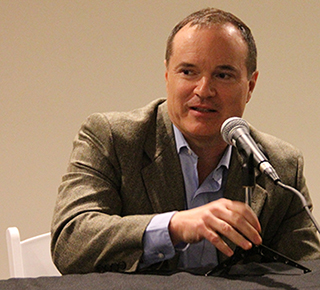 William Winckler promoting Ultraman at the Los Angeles Comic Book and Science Fiction Convention. Photo courtesy of William Winckler.
William Winckler promoting Ultraman at the Los Angeles Comic Book and Science Fiction Convention. Photo courtesy of William Winckler.William Winckler: Wonderful! I attended the Los Angeles [Comic Book and Science Fiction Convention] screenings, and carefully watched the audience. They loved the films, and reacted as I expected. They cheered in the right spots, laughed in the right spots, etc. I was especially watching the children in the audience, and I could see little boys` eyes glued to the screen, spellbound. The kids were absolutely thrilled seeing the movies, and in the American English language, they totally understood / got everything! It all registered mentally for the kids! This never would have happened if the films were subtitled. The kids came up to me afterwards telling me how much they loved the English dubbed movies, who their favorite characters were, and asked if they could get DVDs or Blu-rays! They were so excited and happy! This confirmed everything we did worked like a charm! SciFi Japan: In general, how was the turnout for the theatrical screenings? William Winckler: The Ultraman Movie Double Feature has, overall, been a financial and creative success for Tsuburaya Prods. and Winckler Prods. The theatrical distribution costs were recouped almost immediately, and profits from the limited theatrical run began as box office returns came in from the first few theaters. Some theaters were hit with rough winter weather at the beginning of our run, and some theaters had larger attendances than others, but all were profitable for us. Audience reactions have been positive based on feedback we`re received and have seen. Many movie theater managers told us their audiences really enjoyed the English films and had a great time.
SciFi Japan: Beyond the financial aspects, are you and Tsuburaya Productions seeing any benefits from doing the theatrical run? William Winckler: A tremendous amount of publicity happened with many mainstream newspapers and news outlets across the country. that helped make American audiences more aware of our English Ultraman films. And interest in the English movies from several "major parties" has happened as a result of company executives attending theater screenings. SciFi Japan: Past the theatrical screenings, how will these films be released in North America? William Winckler: The films will be released on many different distribution platforms, including DVD and Blu-ray. More information will be made available when the time comes, which should be soon. Tsuburaya Productions owns all rights and copyrights to the new Hollywood English language versions and the subtitled versions. And they will now, like Disney, be able to license and re-license these films to countless distribution platforms worldwide forever, in perpetuity. People will probably be watching these English Ultraman movies for hundreds of years, long after we’re all gone! SciFi Japan: Are you planning to dub any more Ultraman movies or shows? William Winckler: We’re currently in production on many more films and other projects. We also have new anime pilots in production for another Japanese studio. Stay tuned!
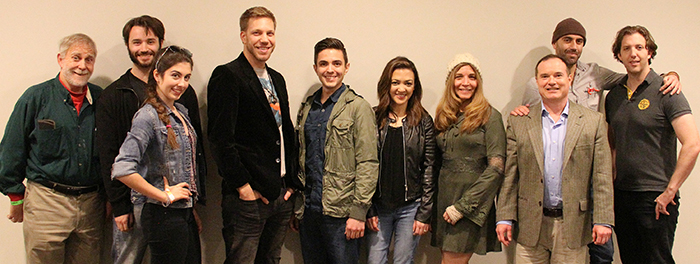 The Ultraman Movie voice cast at the LA Comic Book & Sci-Fi Convention. Photo courtesy of William Winckler.
The Ultraman Movie voice cast at the LA Comic Book & Sci-Fi Convention. Photo courtesy of William Winckler.About William Winckler Productions, Inc.
William Winckler Productions, Inc. has produced and distributed English dubbed anime series in America since 1984. The Hollywood company, run by writer/producer/director William Winckler, has worked with many of the major studios in Japan on popular series and feature film titles such as TEKKAMAN THE SPACE-KNIGHT, GAIKING, DANGUARD ACE, STARZINGER, and dozens of others.
About Tsuburaya Productions
Tsuburaya Productions, creator and copyrights owner of the superhero ULTRAMAN series was founded in 1963 by Eiji Tsuburaya, world-renowned special effects wizard also known for his special effects work on the Godzilla series. With more than fifty years` experience, it is one of Japan`s oldest and most respected independent film and television production houses. Its popular Ultraman TV and film series which premiered in 1966 has been seen in over 100 territories worldwide and has spawned over 3,000 licensed products. In addition to production, the company also handles character licensing and program distribution and staging live stage shows both domestically and internationally.
For more information on ULTRAMAN GINGA S THE MOVIE and ULTRAMAN X THE MOVIE, please see the earlier coverage here on SciFi Japan:
- ULTRAMAN GINGA S THE MOVIE Coming in March 2015
- ULTRAMAN GINGA S THE MOVIE Preview
- ULTRAMAN GINGA S THE MOVIE Photos and Final Trailer
- Ultraman Movies Get All-New English Dubs
- ULTRAMAN GINGA S THE MOVIE Plays Throughout the Philippines
- Tsuburaya Pro Announces ULTRAMAN X THE MOVIE for 2016
- ULTRAMAN X THE MOVIE Press Notes and Images
- Bandai ULTRAMAN X THE MOVIE Figures
- Ultraman Flies into American Theaters in 2017!
- Ultraman Movies: Behind the Scenes of the American Dubs
- Ultraman Movie Double Feature Tickets Now On Sale!
- Ultraman Movie Double Feature Theater List — U.S. and Canada



